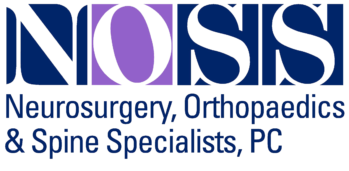The Mind-Body Connection: How Stress Management Can Reduce Pain
Chronic pain can be an unwelcome companion that affects every aspect of our lives. At NOSS, we believe in a conservative approach to patient care. This means that we’ll take the most effective route that causes the least amount of risk to a patient’s long-term well-being. We don’t rush to surgery or medicine until we are confident that it is necessary. As always, we recommend seeking professional medical attention for any persistent pain, or pain as a result of a direct injury.

Chronic pain that hasn’t been tied to a direct injury or condition can be frustrating. It often feels like an unbreakable cycle: the pain causes stress, and stress intensifies the pain. However, there is a powerful solution lying at the intersection of these two challenges – stress management. In this article, we’ll delve into the profound connection between stress and pain, and explore how practicing stress management techniques can lead to effective pain relief and overall well-being.
Understanding the Stress-Pain Connection
When we experience stress, our bodies release stress hormones like cortisol and adrenaline. These hormones can heighten our sensitivity to pain, making discomfort feel more intense than it actually is. Moreover, chronic stress triggers inflammation, which can exacerbate pain in conditions like arthritis, fibromyalgia, and migraines.
Mindfulness Meditation: The Stress-Pain Breaker
One of the most potent tools in stress management is mindfulness meditation. Mindfulness involves focusing your attention on the present moment without judgment. By practicing mindfulness, you can create a mental space that allows you to observe your pain without getting swept away by it. Studies have shown that mindfulness meditation can significantly reduce the perception of pain and improve pain-related outcomes.
Getting Started with Mindfulness Meditation
Find a Quiet Space: Choose a peaceful environment where you won’t be disturbed. This could be a corner of your room or a serene spot in your backyard.
Comfortable Position: Sit or lie down in a comfortable position. Close your eyes and take a few deep breaths to center yourself.
Body Scan: Start by directing your attention to each part of your body, from head to toe. Notice any sensations without judgment.
Focus on Breathing: Shift your focus to your breath. Observe the rise and fall of your chest and the sensation of the breath entering and leaving your body.
Acknowledge Your Thoughts: It’s natural for your mind to wander. When thoughts arise, acknowledge them without judgment and gently bring your focus back to your breath.
Non-Judgmental Awareness: As you continue, expand your awareness to include any pain you might be experiencing. Observe it as a sensation without attaching labels like “good” or “bad.”
Regular Practice: Consistency is key. Start with just a few minutes each day and gradually increase the duration as you become more comfortable.
Deep Breathing and Progressive Muscle Relaxation
In addition to mindfulness meditation, deep breathing exercises and progressive muscle relaxation are effective stress management techniques that can directly impact pain perception. Deep, slow breathing triggers the body’s relaxation response and can help lower stress hormones, promoting pain relief. Progressive muscle relaxation involves tensing and then releasing different muscle groups, helping to reduce physical tension and stress-induced pain.
The Holistic Approach: Comprehensive Pain Relief
Incorporating stress management techniques into your daily routine can bring about comprehensive pain relief. By addressing the mind-body connection, you’re not only reducing the perception of pain but also preventing stress-related inflammation that can worsen your condition. Moreover, these techniques empower you to regain a sense of control over your pain management journey.
Stress management isn’t just a nice-to-have – it’s a crucial component of effective pain management. By understanding and harnessing the power of the mind-body connection, you can break free from the stress-pain cycle. Mindfulness meditation, deep breathing, and progressive muscle relaxation are invaluable tools that can help you take charge of your well-being, leading to improved quality of life and a brighter, pain-free future. Remember, as you embark on this journey, it’s important to be patient with yourself and embrace the process of cultivating a more mindful, stress-resilient lifestyle.

